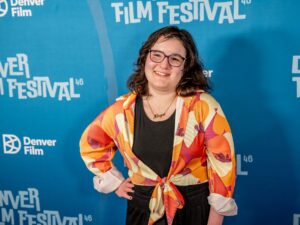I am fortunate to meet and interview many inspiring women. Some have lives that are so compelling that one story is not enough. We had the chance to speak with Dr. Belinda Bennet, Chief International Programs Officer, Children Believe. Bennet is a true change maker. Whether she is advocating for children’s rights, women’s rights, the rights of those that have been excluded or showcasing why women belong at the table of NGOs, she has done it all. According to Bennet:
“My childhood dream was to make a difference with my life and work. This became a goal after growing up in Tamil Nadu, India, and seeing poverty and discrimination all around me.”
She has more than made her dream come true with more than three decades of experience, she heads up the programs-and-policies team of Children Believe. She is a true storyteller and understands the art of conversation. She is our latest #WomenInspiringWomen and one of two that we have made into a second part. Now for our conversation with Dr. Belinda Barret.
Tell us about the role that your parents had in shaping who you are today and why you picked your career path.
Both of my parents were teachers and were very rooted in their Christian faith. Eventually, they resigned, and they went to a seminary with a small stipend. My father was a writer and used to stage plays in this rural setting. I look back and think how enriched we were growing up. I remember one time my father taught me the Gettysburg Address and I recited it in front of my own village. At 10 years old, I didn’t know what I was saying but I enjoyed a very creative childhood.
My father was a chemistry student and couldn’t finish college – my grandmother was a single mother and he needed to help his family. Because of him, I took Honors Chemistry with physics and zoology as my major and I didn’t like it. I went to a wonderful, liberal college [started by an American missionary], became a student leader there and was active in every social club. I realized this social work is what I should be doing, and the head of my chemistry department said you found your mission.
I loved it and studied social work with such passion. I worked with children, and I wanted to take every one of them home – it was heartbreaking. I organized medical camps and met with our bishop to see how he can provide the Mission Hospital support to as many children as possible. So that’s my story.
My first job was working with women in conflict with the law and working with women in prison for life. The office that I was working with looked at what was happening to their children and did a lot of extension work to see how we can unite the family. At the same time, we wanted to help the young people in the family finish school. I was so inspired by this kind of work and the difference it made.
With Children Believe, children go through education but we’re not tracking what they are doing 10 years down the line. I get a glimpse of it sometimes when they talk about how they are reaching out in their communities. In India, I went to a graduation meeting. We have set certain markers for when a community is secure enough to handle its own affairs. We leave and we call it a graduation ceremony – a celebration. I remember one of the women getting up and saying, “I was a dropout in 10th grade. Children Believe and their partners reached out to me and today, I’m a lawyer.” She said in her speech, “Here’s my card and if you need any legal help, come to me”. I was delighted. What we create on the ground keeps us all going.
Community based action and education were an important part of your life growing up. How did your education lead you into the work that you do now with Children Believe?
I grew up in South Tamil Nadu seeing poverty all around me. I saw half of a village wiped out by cholera. I always wanted to be a social worker because of my parents who always had an open home. I completed my bachelor’s degree in chemistry to please my parents, and then went on to do my master’s in social work. Finally, I went on to do my second master’s in psychiatric social work. That is how I ended up becoming a professional social worker.
For nearly one and a half decades I was counseling children. I started a program for street children along with my brother. I used to work with Christian Aid [as the South Asian Head] and ending poverty was our mandate. I was looking for a change at that time when this opportunity [with Children Believe] came and it’s really an honor and privilege to be able to serve and see more children thrive.
We have accomplished so much and I am very proud of what I have accomplished in my life. I have a heart for children and young people. Working with them, giving people an opportunity to be resilient and to be successful is rewarding. It’s how we bring out their potential and how we open doors for young children to complete school, for example since education is the biggest resource that one can give as a gift to a child.
What challenges and benefits do you have as a woman in an NGO?
When you are a professional and you have the skill, your presence should be felt in the room. You don’t belong in a room because you are a woman. It is because you are a person bringing certain skills to the table. Over the years, I’ve built confidence in myself. In the beginning of my career, the tsunami happened, and there was a gathering of all of the international NGOs in Chile. We were having a meeting with some of our donors. I noticed when people were asked about challenges, they mentioned gender equality. I remember looking around. I was the only woman sitting at a table in that room. A second woman was taking notes at the meeting, and a third woman was serving tea. We had a lovely conversation, pointing out how much we have to change. It’s also in each one of us to be leaders of an organization. For me, it was the way I carried myself, believing in what I was doing and becoming more confident as I gained experience.
As far as challenges, in the beginning of my career, I noticed many times when going on a field trip for a full day, there were no toilets, and nobody thought about how it would affect women. Simple things like that have an impact on me. I knew that it wasn’t intentional, and I believe in dialogue. If you ask me what is the most significant impact that Children Believe has made, it is shifting belief systems. That’s not easy. We can build houses, we can build schools, we can even ensure children are going to school, but how do you ensure transformative belief change?
I’ve broken some barriers in my own life. I have tested some of my own beliefs and can tell you many stories about how the change starts with you. I resigned from my first job because, I was so unhappy that they didn’t see value in a woman professional. They thought of us as less. Even then, I tried to engage in dialogue and that is how you become a role model.
Some other challenges are the assumption there are certain things you cannot do. I remember I was in a research role some years ago, and, my chief telling me, that women cannot go there because there are elephants. I said that the elephant doesn’t know gender whether you go, or I go, it won’t matter. People assume that certain things cannot be done by women in community development. If you look at certain NGOs when it comes to supervisory positions, they are often held by men, because the assumption is that women cannot do it. I had a lot of support from my family, and I felt privileged to have that when I dealt with conflicting values and beliefs.
Read part two of our interview with Dr. Belinda Bennet coming up. We will find out how she stays motivated with the uphill battles that she continually faces, learn about how her goals have changed over time, find out who inspires her and much more.








